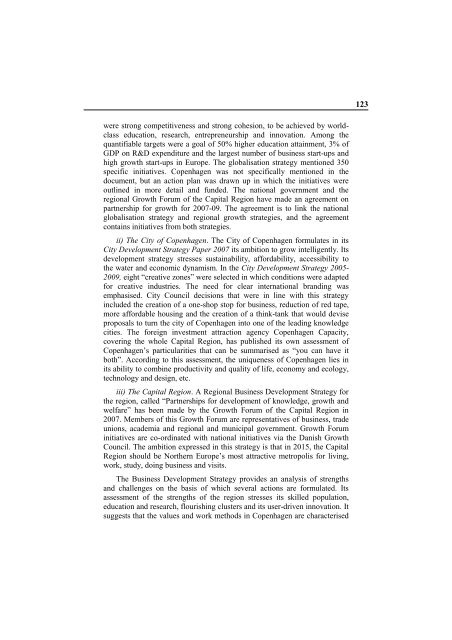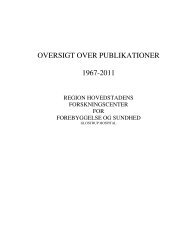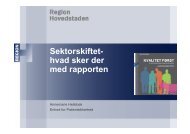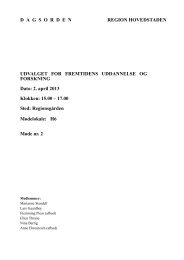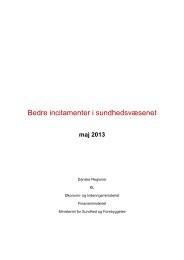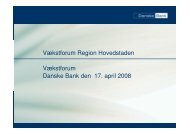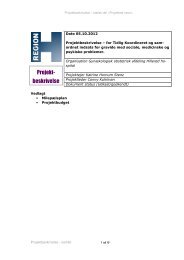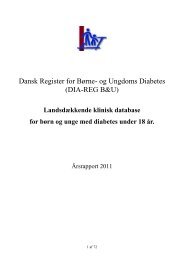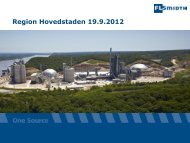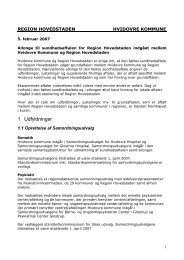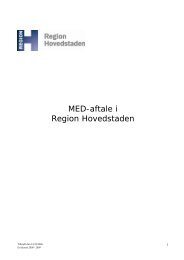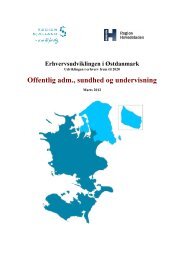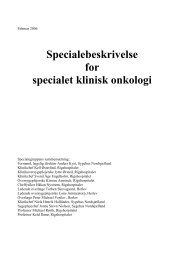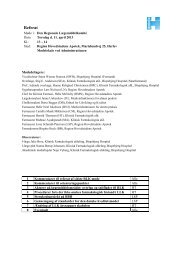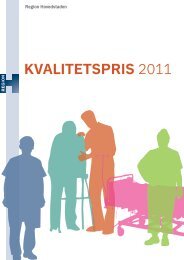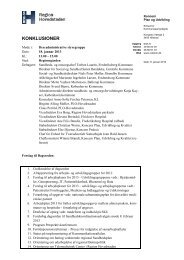Territorial Review Copenhagen - Region Hovedstaden
Territorial Review Copenhagen - Region Hovedstaden
Territorial Review Copenhagen - Region Hovedstaden
Create successful ePaper yourself
Turn your PDF publications into a flip-book with our unique Google optimized e-Paper software.
123<br />
were strong competitiveness and strong cohesion, to be achieved by worldclass<br />
education, research, entrepreneurship and innovation. Among the<br />
quantifiable targets were a goal of 50% higher education attainment, 3% of<br />
GDP on R&D expenditure and the largest number of business start-ups and<br />
high growth start-ups in Europe. The globalisation strategy mentioned 350<br />
specific initiatives. <strong>Copenhagen</strong> was not specifically mentioned in the<br />
document, but an action plan was drawn up in which the initiatives were<br />
outlined in more detail and funded. The national government and the<br />
regional Growth Forum of the Capital <strong>Region</strong> have made an agreement on<br />
partnership for growth for 2007-09. The agreement is to link the national<br />
globalisation strategy and regional growth strategies, and the agreement<br />
contains initiatives from both strategies.<br />
ii) The City of <strong>Copenhagen</strong>. The City of <strong>Copenhagen</strong> formulates in its<br />
City Development Strategy Paper 2007 its ambition to grow intelligently. Its<br />
development strategy stresses sustainability, affordability, accessibility to<br />
the water and economic dynamism. In the City Development Strategy 2005-<br />
2009, eight ―creative zones‖ were selected in which conditions were adapted<br />
for creative industries. The need for clear international branding was<br />
emphasised. City Council decisions that were in line with this strategy<br />
included the creation of a one-shop stop for business, reduction of red tape,<br />
more affordable housing and the creation of a think-tank that would devise<br />
proposals to turn the city of <strong>Copenhagen</strong> into one of the leading knowledge<br />
cities. The foreign investment attraction agency <strong>Copenhagen</strong> Capacity,<br />
covering the whole Capital <strong>Region</strong>, has published its own assessment of<br />
<strong>Copenhagen</strong>‘s particularities that can be summarised as ―you can have it<br />
both‖. According to this assessment, the uniqueness of <strong>Copenhagen</strong> lies in<br />
its ability to combine productivity and quality of life, economy and ecology,<br />
technology and design, etc.<br />
iii) The Capital <strong>Region</strong>. A <strong>Region</strong>al Business Development Strategy for<br />
the region, called ―Partnerships for development of knowledge, growth and<br />
welfare‖ has been made by the Growth Forum of the Capital <strong>Region</strong> in<br />
2007. Members of this Growth Forum are representatives of business, trade<br />
unions, academia and regional and municipal government. Growth Forum<br />
initiatives are co-ordinated with national initiatives via the Danish Growth<br />
Council. The ambition expressed in this strategy is that in 2015, the Capital<br />
<strong>Region</strong> should be Northern Europe‘s most attractive metropolis for living,<br />
work, study, doing business and visits.<br />
The Business Development Strategy provides an analysis of strengths<br />
and challenges on the basis of which several actions are formulated. Its<br />
assessment of the strengths of the region stresses its skilled population,<br />
education and research, flourishing clusters and its user-driven innovation. It<br />
suggests that the values and work methods in <strong>Copenhagen</strong> are characterised


